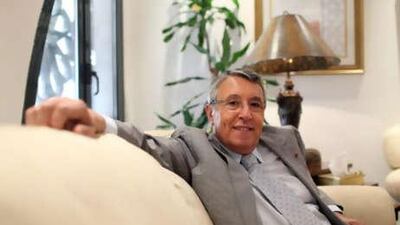"It started way back in 1978," says Mohamed Benaissa, the mayor of Assilah, a small town in northern Morocco. "The argument goes that we are a society with limited or no resources. We have no oil, no gold, no phosphate. At the time we did not have a harbour for fishermen. Now we have one. But we did not have proper electricity, drinking water, etc. So we said we have to use the only resource we have."
That, he announces with a flourish, was "our imagination, our creativity, and our vision". Thus the Assilah Festival was established. It began with a celebration of street mural painting - emphatically not a competition. As Benaissa explains: "We believe that no one really can award a prize to a painter because there is no criteria to say that this painter is better." The only prize is the opportunity to exhibit in the open-air museum that the town has become. The muralists still make the trip. Today, 15 walls of the town are handed over to visiting painters to decorate in the first days of July, ready for the start of the festival on July 10.
"This year we have painters from, I think, two from the United Arab Emirates, two from Germany, one from Jordan and we have Moroccans," Benaissa says. The Emirati painters will be Wasel Safwan and Abdulrahman al Maini. The former seems like an especially happy choice, since he is the proponent of a fresh and lively variant of abstract expressionism that he calls UAEism. They won't be the only UAE presence in town, however. The festival has come a long way since 1978. From a provincial art celebration it has become an international venue for cultural and intellectual exchange. Not least among the many dimensions to the festival is a talking shop that Benaissa calls the "Arab-African-Latin-American forum".
"It used to be chaired by the late president of Senegal, the poet [Leopold] Sedar Senghor, and Prince Hassan bin Talal of Jordan," he says. "Now Sangor died. Last year we had the former president of Ghana, John Kufuor." The organisation is now looking for a Latin-American representative - "somebody who has the shine of knowledge and also some experience of power", Benaissa says. But that, too, is only part of the story.
"We have the workshops. We have the music concerts. We have the exhibitions. We have the summer university," Benaissa explains. "Scholars, thinkers, intellectuals, politicians, scientists, they all come... So it became a platform." It's a platform that will be giving pride of place to the UAE. The nation is sending representatives from Masdar, Adach and the Ministry of Culture, Youth and Community Development, all under the heading: "Renewable energy - a leap towards human development." The deputation will be putting on shows dealing with art, music, literature and film in the Emirates, assisted by some of the leading talents on the UAE cultural scene. "Especially," the mayor says, "we have a colloquium, which is the first of its kind to happen in our part of the world, on the state of the movement, the literary movement, in the United Arab Emirates today."
The festival will also afford an opportunity to present the UAE's innovations in energy and architecture, hence the involvement of Masdar. "We tackle it from the human dimension, not the technical - not the marketing, the economic, but the human dimension," says Benaissa. "To what extent can the renewable energies help development? What kind of development are we going to have really? Because it's a big revolution."
In a sense, the UAE will be staging a small revolution of its own. "The media for a month will have the United Arab Emirates through its exhibitions, through its arts, through its concerts of music and through the presence of Emirati intellectuals, poets, writers, artists, living around the town, eating in small restaurants, living with people," says Benaissa. "We don't have any four-star or five-star hotels in Assilah. It's down-to-earth. It is also an opportunity for us to learn from the United Arab Emirates experience in certain fields."
Benaissa believes the relationship between the two countries has deep roots. "We complement each other," he says. "I think this only reinforces a reality which exists between Morocco and the United Arab Emirates at all levels." He personally has been on the UAE's cultural radar at least since 2008, when he won the title Cultural Man of the Year at the Sheikh Zayed Book Award. Now, he says, the UAE's participation in the festival is set to be "the highest we have ever had from any country".
Each year the festival invites a guest nation. "Last year we had Portugal. The year before we had Mexico. The year before we had Kuwait," he says, though he concedes that "the Kuwaiti one was also good". Benaissa is convinced that the festival has helped turn Assilah's fortunes around. He was a city councillor when the festival was first established, only becoming mayor five years later, in 1983. From the start, the idea was "to instigate in the population a sense of pride and concern," he says. "They love their town, they think it's a beautiful town." The key was to encourage a sense that "together we can make it even more beautiful".
Within two weeks of the muralists first arriving, he says, "the whole town came and began to paint". Workshops in different arts followed, and Assilah became a seat of cultural and intellectual exchange. "The last elections we had, in June 2009, two-thirds of the city council, my colleagues, were all kids at the age of nine, 10, at the festival," Benaissa says proudly. "And who are they? Lawyers, practising law. Pharmacists. Agriculturalists. Environmentalists. These are the people, the new generation, and they came with this spirit - that to develop, you have to use your own initiative."

